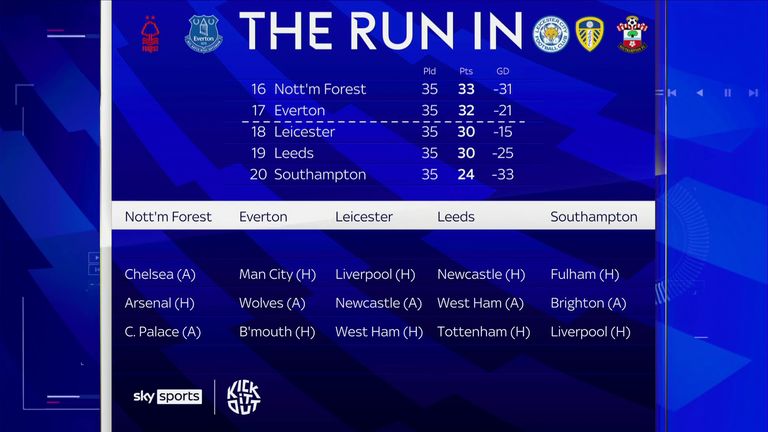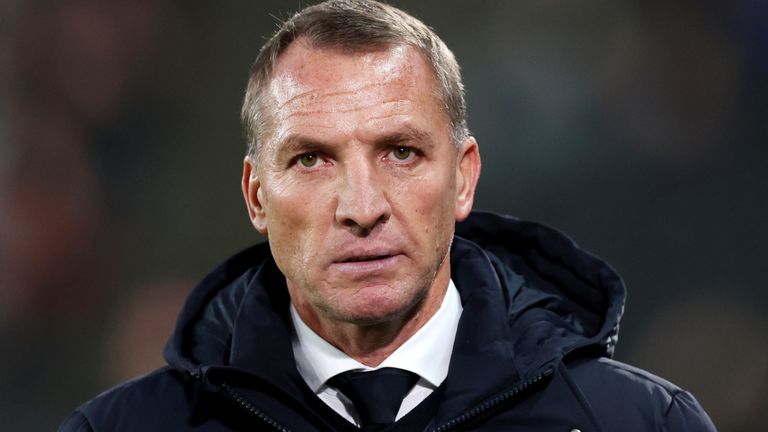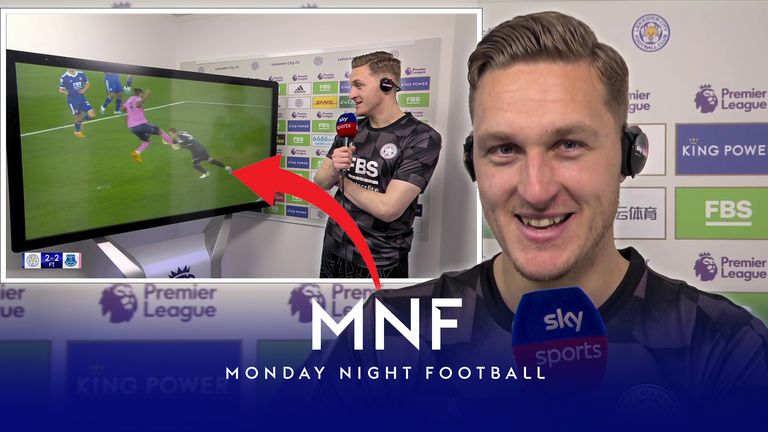Leicester City: From champions to the Championship in seven years? Rob Dorsett assesses the Foxes’ demise
[ad_1]
Seven years ago last weekend, Wes Morgan lifted the Premier League trophy.
Jamie Vardy had broken the top-flight record for goals in consecutive matches, Claudio Ranieri was manager of the year, inside Leicester’s centre circle, Andrea Bocelli famously sang ‘Nessun Dorma’, the club’s owners led the lap of honour round a raucous King Power Stadium, as the footballing world hailed the most unlikely of heroes.
The talk in 2016 was of making such celebrations a more regular occurrence. Plans were quickly put in place to capitalise on the new commercial opportunities, to try to break the ‘Big Six’ monopoly.
It heralded the most successful period in the club’s 139-year history. But now, with three games of the 2023 season to go, Leicester are a shadow of the club they so recently were, and they’re odds-on with the bookmakers to join Southampton in the final relegation places.
Could it really be champions to Championship in the space of seven years?
That spectre looms ever more likely even though, within the changing room and the club offices, there is a determination that the fight for Premier League survival is far from over.
Leicester’s players, I’m told, are bristling at the suggestion they have given up the fight, and are determined to answer their critics in the remaining three matches – with two of those at home, against Liverpool and West Ham, and one away at Newcastle.
The fans though, quite rightly, are bemused about how this has happened. Especially when the last three seasons have seen Leicester challenging for the Champions League themselves, finishing fifth, fifth and eighth. It was only two years ago that Leicester won the FA Cup.
So how has it all gone so spectacularly wrong, so quickly? Here are some of the key reasons.
1. Recruitment
Recruitment has been a key problem. Leicester have excelled in this area for many years, and were an example to so many other clubs, so this has been a shocking failure of late.
Leicester spent more than £70m on Patson Daka, Boubakary Soumare, Jannick Westergaard and Ryan Bertrand last season. This season, they’ve spent more than £50m on Harry Souttar, Wout Faes, Tete and Victor Kristiansen.
Quite simply, they haven’t got £120m worth of quality for that spend based on this season’s performances. Those new signings just haven’t had the impact for which they were bought.
Some of those transfers were made at the height of a crippling injury crisis, when there was a need for more fit players on the training pitch. Nevertheless, Leicester’s recent transfer dealings have cost them dearly.
2. Financial issues
Leicester’s player wage bill is one of the eight biggest in the whole of the Premier League.
Extending the salary spend was a calculated plan by Leicester’s bosses in recent years, to try to bridge the gap and compete with the bigger clubs, and to try to help retain their best players. One of the results of that increased spend was the record loss of £92.5m announced by the club in March (caused partly because the sale of Wesley Fofana to Chelsea hadn’t come through in those accounts).
But that salary investment hasn’t been matched by performances on the pitch.
The club’s owners, King Power, were hit hard by the coronavirus pandemic as their duty-free business suffered a huge downturn. That has stabilised since, as has been emphasised by the chairman, Khun Aiyawatt, announcing in February that he had written off £194m of debt that the club owed to its parent company.
There is no question about their commitment to the club going forward, whichever division Leicester are in next season.
Having been in the Premier League for so long, they would at least receive some healthy parachute payments if they were to drop down to the Championship: 55 per cent of the value of the broadcasting rights each Premier League club receives in the first year, 45 per cent in the second and 20 per cent by the third.
That currently means Leicester will get more than £100m extra in revenue compared to most of their Championship rivals, should the worst happen.
3. Lack of leadership
With the departure of Kasper Schmeichel, the retirement of Wes Morgan, and the lack of regular football for Jamie Vardy, Leicester’s is a noticeably quiet squad.
They have sadly lacked leaders on the pitch this season, vocal organisers who demand the high standards set in the past.
Jonny Evans’ absence through injury has been key. He’s played just once in the Premier League since November, and only 11 times for Leicester all season.
But at 35, it was always going to be a risk relying on him regularly. Leicester just haven’t had someone to galvanise the team during the many tough times on the pitch.
4. A ‘lack of hunger’
Much has been made of James Maddison’s comments after the 5-3 defeat to Fulham, when he said his team wasn’t “hungry enough to win the game”. He has since taken to Twitter to explain that he meant Leicester weren’t “aggressive and on the front foot in duels” rather than a lack of desire to win, or a failure to realise the importance of the club’s predicament.
However, his comments rang true with a lot of Leicester fans, who have felt for some time that too many of the players don’t care enough.
Seven Leicester players are out of contract at the end of this season: Caglar Soyuncu, Evans, Daniel Amartey, Bertrand, Papy Mendy, Ayoze Perez and Youri Tielemans.
While there is no suggestion that any of those players have downed tools (it would be especially wrong to suggest that in the case of Evans and Tielemans) many of those names Leicester will not be sorry to lose.
5. Brendan Rodgers
Part of the blame for Leicester’s predicament has to be laid at Brendan Rodgers’ door. Some supporters feel the relegation threat might not have been so dire had he been sacked earlier.
There is no doubt that Rodgers is a brilliant man-manager and coach, who inspired and encouraged many of Leicester’s youngsters to raise their games. In terms of technical coaching and motivational expertise, he is right up there. Three top-10 Premier League finishes is testimony to that.
But maybe he ran out of steam. His two years and nine months at Celtic was the longest spell he’d spent at any club – until Leicester. Certainly, when I had lunch with him in February to celebrate his four years in charge at King Power Stadium, it did not seem a harmonious place.
He was clearly bitter at what he felt was a lack of financial support from the club, and people questioning his methods. His falling out with Soyuncu (and, to a lesser extent, one or two other senior players) hinted at wider problems in the camp.
His inability to address Leicester’s long-standing weakness in defending set-pieces will haunt him.
6. Awful defending
Leicester have conceded 64 goals in 35 Premier League matches. That is at the heart of their problems. True – Leeds, Nottingham Forest and Bournemouth have all conceded more, but Leicester’s ‘goals against’ column has swelled badly in the latter stages of the season when it has really mattered.
It is now 21 league games without a clean sheet. They’ve shipped 12 in their last five matches. And their defensive woes stretch back to the whole of last season, when only Newcastle in the top 15 places in the division, conceded more.
Since the sale of Harry Maguire to Manchester United three years ago, Leicester have been in the market for a top-class central defender to replace him. Wesley Fofana’s move to Chelsea last summer only compounded their defensive shortcomings.
Souttar looks an excellent prospect for the future, but had never played in the Premier League. Faes, too, looks promising, but hasn’t been able to show the consistency of performance needed.
Soyuncu – one of the best central defenders in the Premier League a few years ago – was frozen out.
7. Goalkeeping woes
As if to compound Leicester’s defensive frailties, they’ve lacked a top-class goalkeeper.
It was a crazy decision to allow Kasper Schmeichel to leave for Nice in the summer. Leicester’s bosses wanted to reward him for his incredible service to the club, and so didn’t stand in his way when he told them of the better contract on the table in France.
Whether Schmeichel was trying to negotiate a better offer from Leicester or not, it left the squad bereft of an experienced, elite-level goalkeeper.
Danny Ward played just one Premier League match last season – the last one of the campaign, at Watford. Daniel Iversen had spent the entire time on loan at Preston in the Championship.
Leicester were embarking on a Premier League season without a goalkeeper who had any real experience in the division. And it has showed.
And so, barring an unlikely set of results in the final three games of this season (which is far from impossible, by the way), Leicester are staring down the barrel of a return to the Championship after nine seasons away.
In those nine seasons, Leicester have climbed to the pinnacle of English football, with success that will never be forgotten, and which is unlikely to ever be matched.
But oh – what a world away that Premier League title feels, just seven years later.
[ad_2]
Source link









